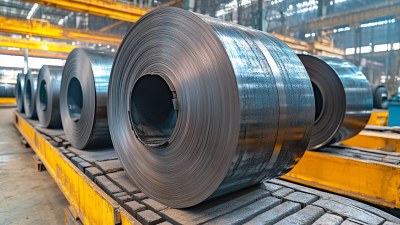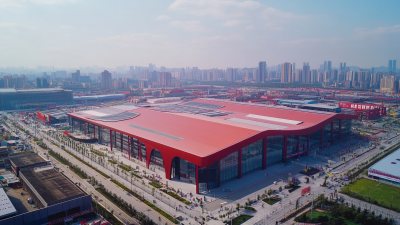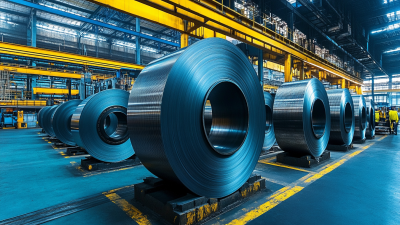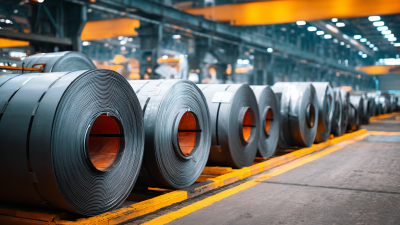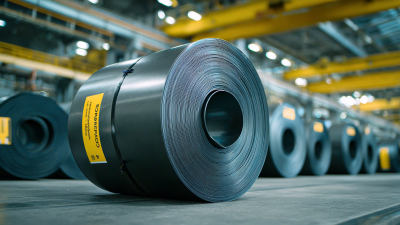 In the ever-evolving landscape of global trade, the procurement of materials such as Carbon Steel Coil Cold Roll presents unique challenges for international buyers. As the demand for high-quality steel products continues to rise, understanding the complexities associated with sourcing becomes crucial. From navigating supplier reliability to ensuring compliance with varying international standards, buyers often encounter common issues that can impede smooth transactions. Additionally, fluctuations in pricing and shipping logistics further complicate the sourcing process. This blog aims to elucidate these common challenges faced by global buyers, providing insights and strategies to overcome them effectively. By addressing key issues, we will empower businesses to make informed decisions when sourcing Carbon Steel Coil Cold Roll, ultimately enhancing their supply chain efficiency and competitiveness in the market.
In the ever-evolving landscape of global trade, the procurement of materials such as Carbon Steel Coil Cold Roll presents unique challenges for international buyers. As the demand for high-quality steel products continues to rise, understanding the complexities associated with sourcing becomes crucial. From navigating supplier reliability to ensuring compliance with varying international standards, buyers often encounter common issues that can impede smooth transactions. Additionally, fluctuations in pricing and shipping logistics further complicate the sourcing process. This blog aims to elucidate these common challenges faced by global buyers, providing insights and strategies to overcome them effectively. By addressing key issues, we will empower businesses to make informed decisions when sourcing Carbon Steel Coil Cold Roll, ultimately enhancing their supply chain efficiency and competitiveness in the market.
When sourcing carbon steel coil cold roll, global buyers often encounter significant challenges in quality assurance. One of the primary issues is the inconsistency in product specifications between different suppliers. Variations in thickness, width, and mechanical properties can lead to discrepancies in the final applications, impacting overall performance. To mitigate these risks, buyers must implement stringent quality control measures, including the establishment of clear standards and expectations before initiating partnerships with manufacturers.

Additionally, the lack of transparency in the supply chain poses another challenge for buyers. Many times, the materials undergo multiple layers of handling, making it difficult to track the quality from the source to the end product. Without comprehensive certification processes and thorough inspections at each stage, the likelihood of receiving subpar products increases. Consequently, it is essential for buyers to conduct due diligence and work closely with reputable suppliers who prioritize quality and offer traceability for their materials, ensuring that the end product meets the required standards.
When sourcing carbon steel coil cold roll, global buyers often encounter significant cost variability that influences their sourcing decisions. According to a recent report by the World Steel Association, the price of cold rolled steel has fluctuated by over 30% in the past two years, largely due to volatility in raw material prices and changing supply chain dynamics. This unpredictability not only complicates budgeting but also impacts long-term contract negotiations, as buyers struggle to determine the right timing and quantity for purchases.
Furthermore, a study by the Global Steel Innovations Forum indicates that fluctuating costs can lead to a 15% increase in overall procurement expenditure for companies that do not strategically manage their supplier relationships. As suppliers face their own cost pressures from labor and energy, buyers must remain vigilant in monitoring market trends, seeking alternative suppliers, or potentially investing in inventory during lower price periods. This strategic approach can mitigate risks and provide a buffer against sudden cost spikes, reinforcing the importance of being adaptable in the global steel market.
Navigating trade regulations is a critical challenge for global buyers sourcing cold rolled carbon steel. According to a report by the World Steel Association, the global demand for cold rolled steel is projected to reach 102 million metric tons by 2025, underscoring the increasing reliance on international suppliers. However, understanding the diverse regulatory landscapes in countries of manufacturing and importing remains paramount. Tariffs, import quotas, and local compliance standards can significantly affect sourcing strategies, leading to increased costs and potential delays.
Moreover, buyers must stay abreast of evolving environmental regulations that impact the carbon steel industry. The International Energy Agency reports that steelmaking is responsible for approximately 7% of global CO2 emissions, prompting many countries to implement stricter emissions standards. This not only influences production practices but also affects import policies. Engaging with local legal experts and trade consultants can provide invaluable insights into navigating these complexities, ensuring that sourcing strategies align with both corporate sustainability goals and regulatory requirements.
| Issue | Description | Impact | Solution |
|---|---|---|---|
| Tariff Changes | Frequent changes in tariffs can affect costs. | Increased operational costs leading to reduced margins. | Stay updated with trade agreements and consider locking in prices. |
| Quality Standards | Different countries have varying quality standards. | Risk of receiving non-compliant products. | Ensure thorough supplier audits and quality checks. |
| Customs Delays | Unexpected customs examinations can cause delays. | Delays in delivery schedules impacting customer satisfaction. | Plan for potential delays and communicate with customs brokers. |
| Logistics Challenges | Shipping disruptions may occur due to various factors. | Increased shipping costs and delivery timeframes. | Diversify shipping options and establish contingency plans. |
| Vendor Reliability | Trust issues with overseas suppliers can arise. | Potential for fraud or substandard products. | Build relationships and verify vendor credentials proactively. |
Supply chain disruptions have become an increasingly common challenge for global buyers sourcing carbon steel coil cold roll. Factors such as geopolitical tensions, fluctuating demand, and transportation delays can severely impact availability. These disruptions not only create uncertainty but can also lead to increased costs and extended lead times. Buyers must adapt to these evolving conditions by finding reliable suppliers and diversifying their sourcing strategies.
Tips for mitigating the effects of supply chain disruptions include building strong relationships with multiple suppliers, which can provide backup options when one source is compromised. Additionally, maintaining an accurate inventory and understanding market trends can help companies anticipate shortages and strategically plan their purchases. It’s also beneficial to keep an open line of communication with suppliers to stay informed about potential risks and delays.
By being proactive and prepared, global buyers can navigate the complexities of sourcing carbon steel coil cold roll amidst disruptions. Regularly reviewing and adjusting procurement strategies can ultimately lead to a more resilient supply chain and improved outcomes in the face of unforeseen challenges.
When sourcing carbon steel coil cold roll, global buyers often encounter challenges in identifying reliable suppliers. The credibility of a supplier is paramount, as it directly impacts the quality of materials and the overall procurement process. Key factors to consider include the supplier’s reputation in the industry, production capabilities, and past client reviews. A thorough background check can reveal potential red flags, such as inconsistent delivery timelines or customer complaints, which can severely affect the sourcing experience.

Additionally, buyers should evaluate the supplier's certification and compliance with international standards. Certifications like ISO 9001 can indicate a commitment to quality management systems, while adherence to environmental regulations ensures sustainable practices. Communication plays a crucial role as well; being able to engage with suppliers who are responsive and transparent about their processes can lead to a more fruitful partnership. Establishing clear criteria for evaluating potential suppliers can significantly mitigate risks and enhance sourcing efficiency in the competitive steel market.

